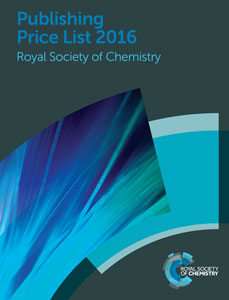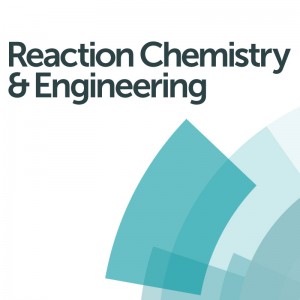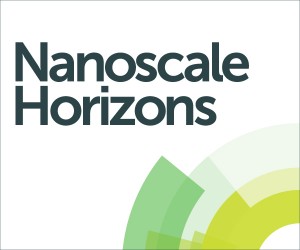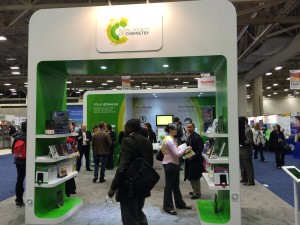Royal Society of Chemistry journals are widely cited, globally respected, and always high quality.
We, alongside every one of our authors, have exacting standards, because we know that publishing the best research secures the brightest future for the chemical sciences.
Once again, these exceptional standards are reinforced by the recently published 2014 Journal Citation Reports ®, with 70% of our journals seeing an increase in Impact Factor (IF).
Individual journal Impact Factor highlights include:
• Energy & Environmental Science’s Impact Factor has increased 32.5% to 20.523, and is in the top 5% of journals in all four of its listed ISI categories.
• Chemical Society Reviews (33.383), Catalysis Science & Technology (5.426) and Green Chemistry (8.020) all increased 9-17% in 2014.
• In the first IF ranking since their launch as three separate journals, Journal of Materials Chemistry A, B and C all have an Impact Factor greater than 4, with Journal of Materials Chemistry A above 7.
• Chemical Science, the world’s first high impact, high quality Open Access chemistry journal has increased by 7.1% since 2013 to 9.211. It’s also ranked 14 out of 157 in the ‘Chemistry, Multidisciplinary’ category (top 10%).
And looking at our achievements overall:
• Of the top 20 journals in the multidisciplinary chemistry category, six are from the Royal Society of Chemistry, two of which are top 10. No other publisher has more.
• 85% of our journals now have an IF above 3.
• Almost three-quarters (73%) of our journals are in the top 25% of their ISI categories.
More authors are choosing to publish their best work with us. The number of published articles in Royal Society of Chemistry journals increased by 32% 2013-14, a much larger rise than other publishers.
So the figures speak for themselves. Whether it’s to publish your research, or read cutting-edge work of the highest quality, our journals portfolio should be at the top of your list.
Thank you to everyone who has helped us set such high benchmarks for chemical science research. Let’s keep up the good work.
To contribute to our next Impact Factor…
Register to receive email updates about our journals, including calls for papers, most accessed articles, themed issues and breaking news.
2014 Journal Citation Reports ® in full:
| Journal |
2014 Impact Factor |
Five-year Impact Factor |
| Analyst |
4.107 |
4.140 |
| Analytical Methods |
1.821 |
1.840 |
| Biomaterials Science ǂ |
3.831 |
3.831 |
| Catalysis Science & Technology |
5.426 |
5.525 |
| Chemical Communications (ChemComm) |
6.834 |
6.779 |
| Chemical Science |
9.211 |
9.203 |
| Chemical Society Reviews |
33.383 |
36.001 |
| Chemistry Education Research and Practice* |
2.091 |
1.832 |
| CrystEngComm |
4.034 |
4.022 |
| Dalton Transactions |
4.197 |
3.982 |
| Energy & Environmental Science |
20.523 |
19.198 |
| Environmental Science: Processes & Impacts ǂ |
2.171 |
2.171 |
| Faraday Discussions |
4.606 |
4.390 |
| Food & Function |
2.791 |
3.046 |
| Green Chemistry |
8.020 |
8.294 |
| Integrative Biology |
3.756 |
4.309 |
| JAAS (Journal of Analytical Atomic Spectrometry) |
3.466 |
3.020 |
| Journal of Materials Chemistry A ǂ |
7.443 |
7.449 |
| Journal of Materials Chemistry B ǂ |
4.726 |
4.729 |
| Journal of Materials Chemistry C ǂ |
4.696 |
4.701 |
| Lab on a Chip |
6.115 |
5.775 |
| MedChemComm |
2.495 |
2.612 |
| Metallomics |
3.585 |
3.980 |
| Molecular BioSystems |
3.210 |
3.191 |
| Nanoscale |
7.394 |
7.762 |
| Natural Product Reports (NPR) |
10.107 |
10.545 |
| New Journal of Chemistry (NJC) |
3.086 |
2.986 |
| Organic & Biomolecular Chemistry (OBC) |
3.562 |
3.382 |
| Photochemical & Photobiological Sciences |
2.267 |
2.618 |
| Physical Chemistry Chemical Physics (PCCP) |
4.493 |
4.219 |
| Polymer Chemistry |
5.520 |
5.723 |
| RSC Advances |
3.840 |
3.907 |
| Soft Matter |
4.029 |
4.289 |
| Toxicology Research |
3.983 |
3.983 |
ǂ Partial IF only
*Chemistry Education Research and Practice is listed in the Education, Scientific Disciplines category. It is the highest ranked journal devoted solely to chemistry education.
A journal’s Impact Factor is an indication of the average number of citations received per individual paper in the preceding two years. The annual figure is calculated by dividing the number of citations to relevant articles in a year by the number of citeable articles published in the preceding two years.
The Five-year Impact Factor is an indication of the average number of times articles from a journal published in the past five years have been cited in the Journal Citation Reports year. For journals in subjects where citation activity continues to rise through several years, this metric allows more of their total citation activity to be included in a critical performance metric.
Data based on 2014 Journal Citation Reports ®, (Thomson Reuters, June 2015).
Comments Off on Impact Factors 2014















